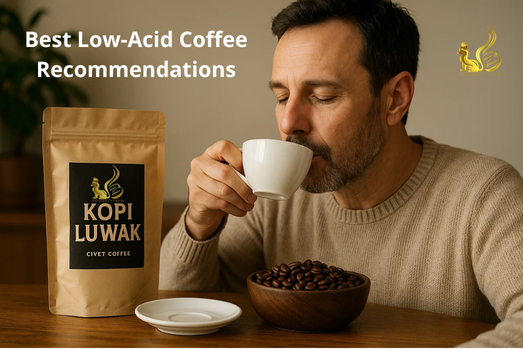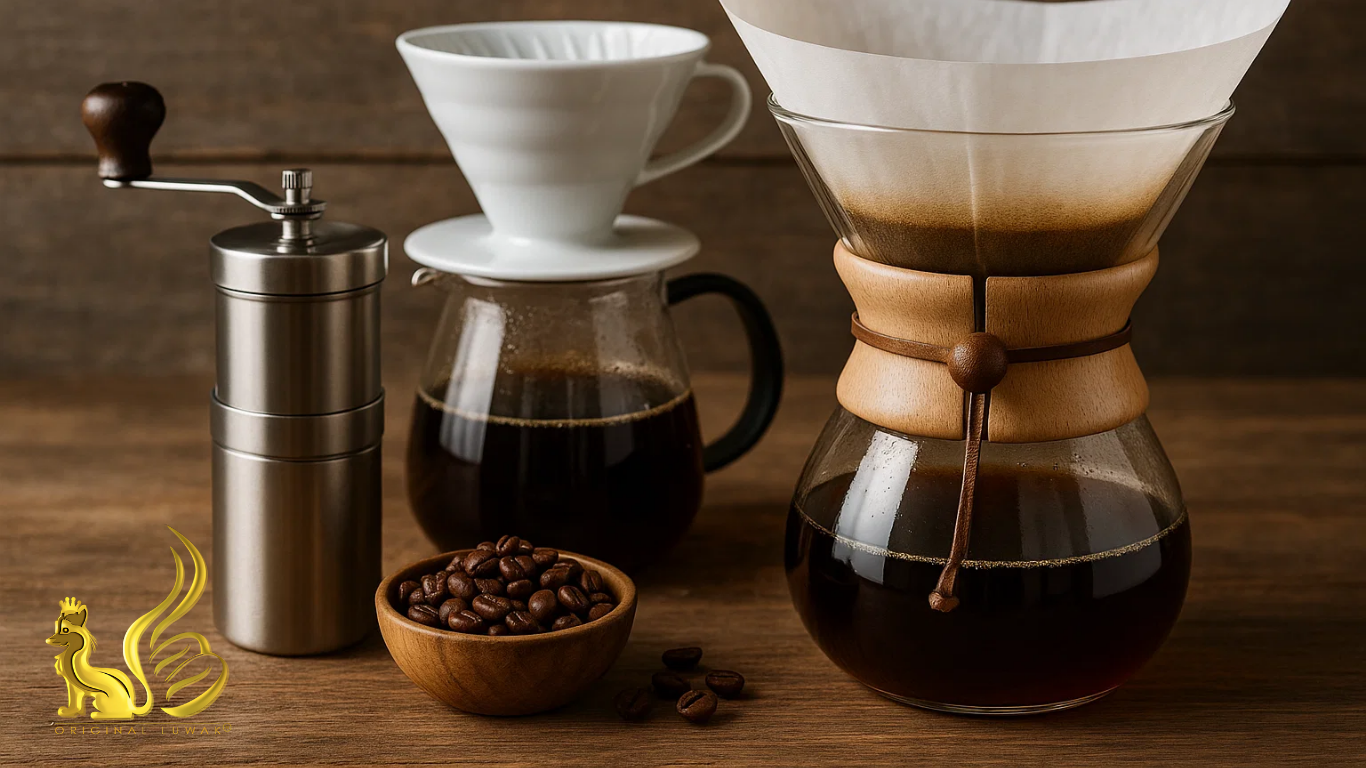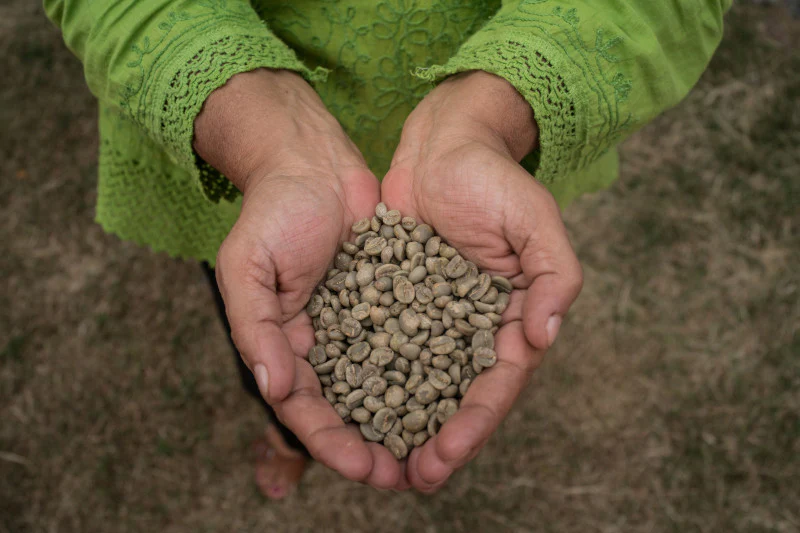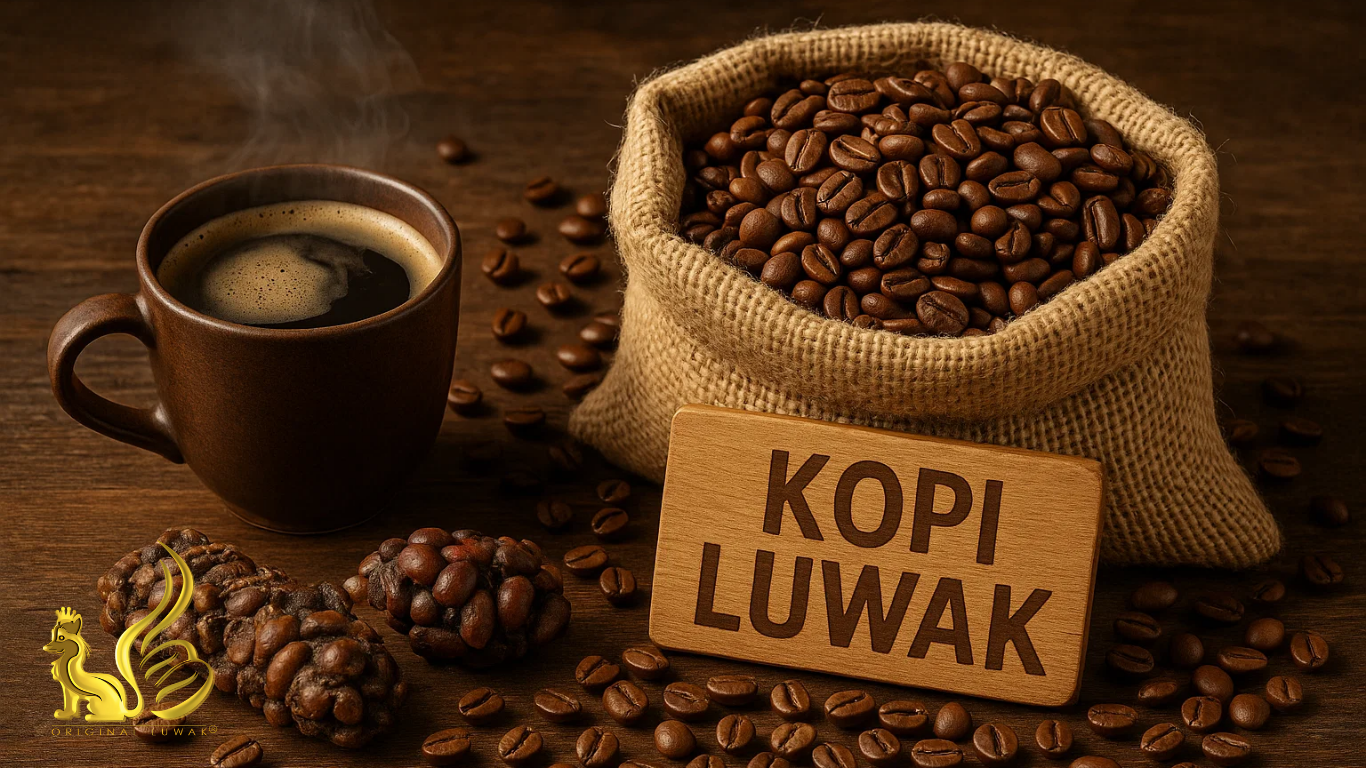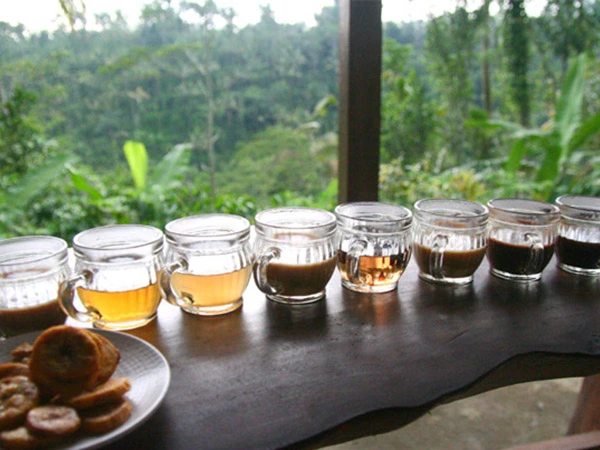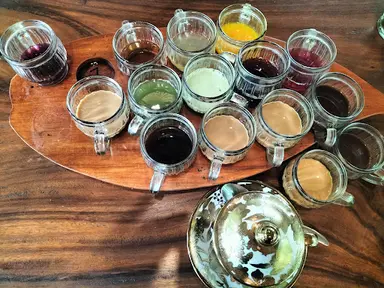Stomach Sensitivity and Choosing the Right Coffee
For coffee lovers, the pleasure of sipping a cup of coffee in the morning is a delightful routine. However, not everyone can enjoy coffee without worry. For people with gastritis or sensitive stomachs, coffee often triggers a burning sensation, nausea, and even heartburn. This has led to the emergence of various low-acid coffee options that are gentler on the stomach. One that has garnered significant attention is Kopi Luwak.
This article will delve into what low-acid coffee is, its benefits for people with gastritis, and the best coffee recommendations—including why Kopi Luwak can be an excellent choice.
What is Low-Acid Coffee?
Low-acid coffee is a type of coffee that has a more neutral acidity (pH) level compared to regular coffee. Generally, coffee’s acidity is influenced by:
- The type of coffee bean (Arabica or Robusta)
- The altitude where it is grown
- Post-harvest processing
- Roasting method
- Brewing method
Low-acid coffee is typically processed using specific techniques like dark roasting, cold brewing, or comes from beans grown in low-altitude regions. The goal is to reduce the levels of chlorogenic acid and other compounds that can irritate the stomach.
Why Can Acidity in Coffee Bother the Stomach?
A study published by Harvard Health Publishing (2022) states that coffee contains substances that can trigger excess stomach acid production, especially in people with GERD or gastritis. These substances include:
- Caffeine
- Chlorogenic acid
- Tannin compounds
When stomach acid increases, the stomach lining can become irritated, causing symptoms like epigastric pain, nausea, and even acid reflux. Therefore, choosing a low-acid coffee is a solution for those who still want to enjoy coffee without a burning sensation.
Benefits of Low-Acid Coffee
- Gentler on the Stomach
- Reduces the risk of heartburn and discomfort after drinking coffee.
- Rich in Antioxidants
- Despite being low in acid, coffee still contains polyphenols that are good for the body.
- Minimal Caffeine Side Effects
- Many low-acid coffees are processed in a way that also lowers the caffeine content.
- Smoother Flavor
- The flavor of low-acid coffee tends to be smoother and less sharp on the palate.
Kopi Luwak: A Naturally Low-Acid Coffee That’s Stomach-Friendly
One coffee often mentioned for its naturally low acidity is Kopi Luwak. More than just an exotic coffee with a natural fermentation process in the digestive system of the civet, this coffee has advantages for people with gastritis.
What Makes Kopi Luwak Low-Acid?
- Natural Fermentation in the Civet’s Digestion
- This process reduces the levels of proteins and acidity-causing compounds, including chlorogenic acid.
- Easier to Digest
- According to a study by Sridevi et al. (2010), fermentation by enzymes in the civet’s digestive tract produces coffee with a lighter chemical structure that is easier for the stomach to tolerate.
- Smooth Flavor with Minimal Aftertaste
- The characteristic of Kopi Luwak is its smooth flavor, with a light aftertaste that doesn’t cause nausea.
- Controlled Roasting Process
- Quality Kopi Luwak producers like Original Luwak generally use a medium to dark roasting method to ensure the acid level remains low.
Best Low-Acid Coffee Recommendations
Here are a few types of low-acid coffee that can be great choices:
- Original Kopi Luwak — Naturally Fermented, Safe for the Stomach
- Origin: Indonesia (Sumatra, Java, Bali)
- Advantages: Natural fermentation process, low acidity level, smooth flavor.
- Good for: People with mild to moderate gastritis, exclusive coffee connoisseurs.
- Cold Brew Coffee
- Method: Brewed with cold water for 12–24 hours.
- Advantages: Reduces natural acidity by up to 60%.
- Note: Choose high-quality Arabica coffee beans.
- Low-Altitude Arabica Coffee
- Origin: Brazil, South Sumatra, Papua.
- Advantages: Earthy flavor, more neutral acidity level compared to high-altitude beans.
- Dark Roast Coffee
- Advantages: A longer roasting process lowers the level of chlorogenic acid.
- Tip: Avoid high-caffeine coffee if your stomach is very sensitive.
Tips for Brewing Low-Acid Coffee
- Use a cold brew or French press method to reduce acidity.
- Use clean water with a neutral pH.
- Avoid brewing with water that is too hot (>92°C).
- Add plant-based milk or oat milk to neutralize the acidic taste.
FAQ: Common Questions About Low-Acid Coffee
- Is Kopi Luwak safe for people with GERD or gastritis?
Yes, especially when consumed in moderation and without excessive sugar. The natural fermentation process of Kopi Luwak lowers the levels of acidity and proteins that trigger stomach irritation. - What is the difference between low-acid coffee and decaffeinated coffee?
Low-acid coffee focuses on pH and acidity, while decaffeinated coffee removes the caffeine content. Some coffees can have both, but the effects are different. - Is all Kopi Luwak low-acid?
Not all. Only genuine Kopi Luwak that is properly processed has a low acid content. Make sure to buy from a trusted producer like Original Luwak. - Is it okay to drink coffee during a gastritis flare-up?
It is not recommended. It’s best to drink coffee after your stomach condition is stable and to avoid it on an empty stomach.
Conclusion
Choosing the right coffee is very important for people with gastritis or sensitive stomachs. Low-acid coffee offers a delicious solution without a burning sensation, and Kopi Luwak stands out as one of the best in its class. Its natural fermentation process lowers the acid content while preserving its distinctive, exclusive flavor. If you are looking for a more stomach-friendly coffee alternative, don’t hesitate to try Kopi Luwak from our product

